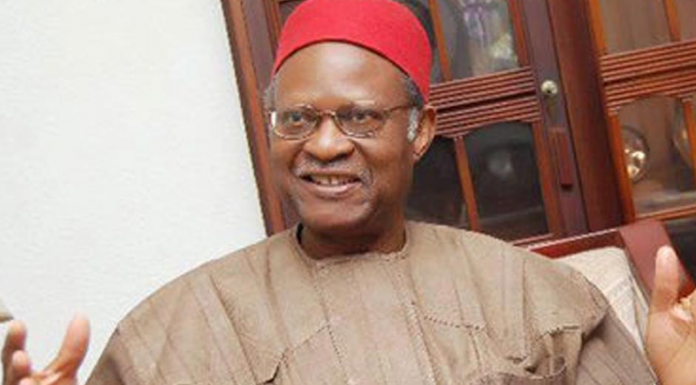
Former Commonwealth Secretary-General, Chief Emeka Anyaoku, has called for the unity and integration of African states in order to advance development among Africans.
Anyaoku made the call while delivering a keynote speech at the 1958 All African People’s Conference (AAPC), organised by the trio of the Institute of Commonwealth Studies (ICWS), the School of Advanced Study (University of London), and the Westminster United Nations Association, to mark the 60th anniversary of AAPC, which held in London.
Anyaoku who assessed the impact of the 1958 AAPC Conference on Africa, admitted that a major objective of the conference which was the attainment of the unity and integration of African States, was yet to be achieved.
According to him, despite the gallant efforts in the transformation of the African Union (AU), the establishment of the New Partnership for Africa’s Development (NEPAD) and the active support for the sub-regional organisations like the Economic Community of West Africa States (ECOAWS), the East African Economic Community (EAC), the Southern Africa Development Community (SADC), the African continent still has a long way to go in its integration efforts.
Extolling the virtues and efforts of the former President of Ghana, Kwame Nkrumah, in uniting Africans, Anyaoku quoted Nkrumah who had said: “The independence of Ghana is meaningless unless it is linked up with total liberation of the whole African continent”.
Nkrumah’s call for African unity, in other words his Pan Africanism, “was deeply rooted in the racial discrimination he suffered in the USA and his association with the other Pan Africanists with whom he interacted at the Manchester Pan Africanist Congress,” Anyaoku said, adding that although Nkrumah was conscious of the need for Africa’s and Ghana’s economic and social development, his primary aim in organising the 1958 AAPC was to mobilise support for the struggle to end colonialism and racism against Africans and peoples of African descent. According to Anyaoku, Nkrumah had in this regard in his famous address to Ghana Parliament declared “seek ye first the political kingdom and all other things shall be added unto you.”
He said Africa’s potentials for integration in ways comparable to Europe, were still seriously hampered by certain paradoxes.
“This is in addition to the low level of economic development that is in many ways exacerbated by the constraints on Africa by the negative forces of globalization and the fact that the economies of many African countries are still commodity centered.
“There is also the inhibitive influence of Africa’s colonial legacies as well as the continued manipulations by interests external to the continent. These factors and forces continue to aid Africa’s divisions and inability to integrate. But more perniciously, conflicts and political instability are still rife in many African countries, with the guns still booming in the Great Lakes Region, in Libya, in South Sudan, and in Somalia.
“Again, a democracy deficit in many African countries, with a serious hiccup still being experienced in countries like The Gambia where the former President Yahaya Jammeh was practically forced out of power by the ECOWAS leaders when he refused to leave office after losing an election, and the DR Congo where the election that is scheduled to hold this month (December 2018) is still be clouded by endless controversies, and Cote d’Ivoire, the Central African Republic, Mali and Cameroon, where democratic practice is under very serious strains,” Anyaoku said.
He called on Commonwealth to continue to lend itself as a platform for the promotion of peace, human rights, socio-economic development and general wellbeing of the peoples of its African members.
Credit: Thisday






